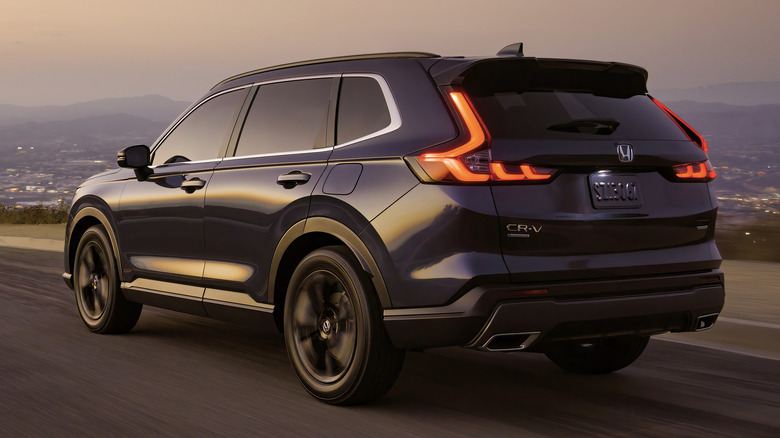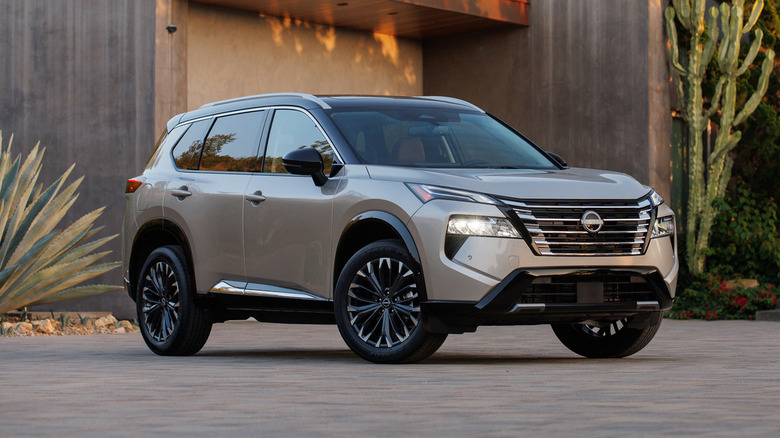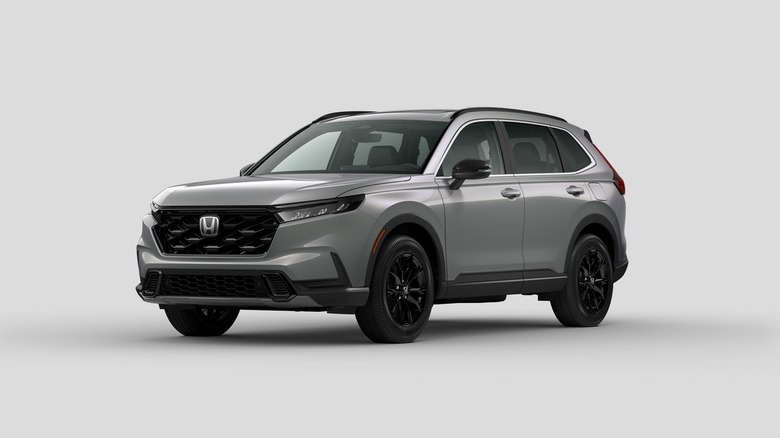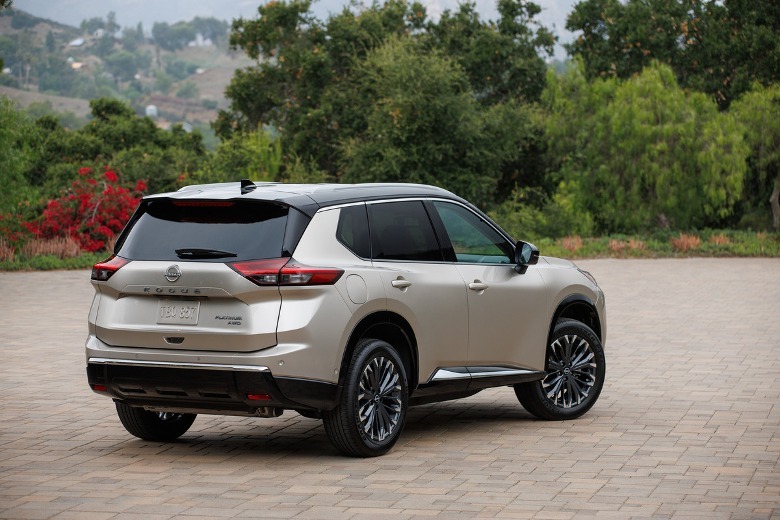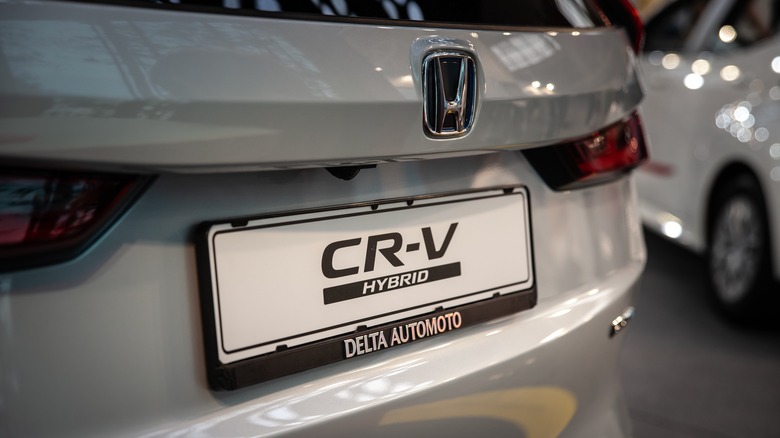Honda CR-V Vs. Nissan Rogue: Which Is The Better Crossover SUV?
The Honda CR-V and Nissan Rogue are two of the most popular crossovers in American streets. The CR-V was among the pioneers of the crossover trend, and has been strutting its wares since 1997. Now, in its sixth-generation model, the 2024 Honda CR-V continues to impress with its decent styling, spacious interior, and reputation for durability and reliability. There's also a CR-V Hybrid that returns a combined 37 mpg.
Meanwhile, the Nissan Rogue was introduced in 2007 to replace the X-Trail and truck-based Xterra SUV. Nissan introduced a Rogue Hybrid model in 2017 that only lasted until 2020, which means the existing third-generation Rogue is only available with a gas powertrain. Nissan gave the 2024 Rogue a few styling, interior, and technology updates while retaining its affordable MSRP, making it an attractive option for budget-conscious shoppers.
However, which is the better crossover? The Honda CR-V has the pedigree of a top-selling name, while the Rogue is Nissan's most popular car in America. It largely boils down to brand loyalty, but let's dive deeper.
Which is the more practical crossover?
The Honda CR-V and Nissan Rogue are somewhat identical on paper. They're almost the same size and offer nearly the same interior space and cargo room. The CR-V edges out the Rogue by offering up to 41.1 and 39.3 inches of front and rear legroom, and it has a more spacious trunk capable of swallowing up to 76.5 cubic feet worth of stuff (39.3 cubic feet with the second-row seat upright).
On the other hand, the Nissan Rogue has 41.5 and 38.5 inches of legroom in the front and second row, while cargo space is 36.5 cubic feet with the rear seats upright and 74.1 cubic feet when folded. The CR-V could carry more stuff, but the Rogue's trunk space doesn't disappoint.
Furthermore, the CR-V and Rogue are equal in the towing department. Both could tow up to 1,500 pounds (properly equipped), which is just about right for a small crossover SUV. Choosing the Honda CR-V Hybrid reduces the towing capacity to 1,000 pounds, but you should be looking at a truck or larger SUV if you want to tow more.
Horsepower and fuel economy of the CR-V and Rogue
Under the hood of a 2024 Honda CR-V is a 1.5-liter turbocharged four-cylinder engine, with 190 horsepower and 179 pound-feet of torque, turning the front-wheel drivetrain via CVT gearbox. All-wheel drive remains optional. The CR-V's powertrain enables an EPA-rated 30 mpg combined with FWD, and 29 mpg with AWD.
Meanwhile, the 2024 Nissan Rogue has a 1.5-liter turbocharged three-cylinder engine with 201 horsepower and 225 pound-feet of torque. It turns the front (or all four wheels, depending on trim/options) using an Xtronic CVT gearbox. The Rogue has more power and torque than the CR-V, and is a bit more fuel-efficient due to its three-cylinder engine. The EPA rates the Nissan Rogue at 33 mpg combined with FWD, and 31 mpg with AWD.
The Rogue is the clear winner in engine power and fuel economy, but it's not as rosy as it seems. The Nissan Rogue's Xtronic CVT transmission is known for giving up the ghost before the warranty expires (2014-2018 model years). Nissan has issued multiple class action settlements to address numerous complaints, including with current year models.
On the other hand, the CR-V has dealt with Takata airbag issues and fuel system problems, while the 1.5-liter turbocharged Earth Dreams engine in some 2019-2023 CR-Vs was known to suffer from oil dilution issues.
Nissan is cheaper, but Honda's reputation precedes its vehicles
The Honda CR-V is an IIHS Top Safety Pick and comes standard with Honda Sensing safety equipment. The ADAS package includes collision mitigation braking, adaptive cruise control, forward collision warning, lane-keeping assist, lane departure warning, and road departure mitigation. Meanwhile, the Nissan Rogue has a five-star NHTSA rating and comes standard with Nissan Safety Shield 360 safety tech. It includes automatic emergency braking, lane departure warning, rear cross-traffic alert, automatic high beams, and blind-spot warning.
The 2024 Nissan Rogue is better than ever, but the Honda CR-V remains the benchmark. Budget-conscious shoppers will appreciate Nissan's affordable pricing, with figures marginally lower than those of the CR-V's starting MSRP. Still, the Honda CR-V has been strutting its wares for nearly 30 years for a reason: It exemplifies all the merits of an ideal family crossover, and continues to do so over its six-generation (and counting) lifecycle.
In short, you can't go wrong with either crossover, but it's hard to ignore Honda's reputation for obsessive engineering and reliable build quality.
